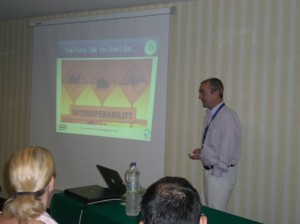Keynote: Stefan Gradmann, Humboldt University: Interoperability Challenges in Digital Libraries
The keynote from Stefan Gradmann, a distinguished member of the community, helped set the scene of the Workshop with some insightful background information.

Stefan Gradmann, Humboldt University: Keynote
Within the framework of the European Commission’s i2010 (Lisbon) Agenda, Digital Libraries (DLs) represent one of the three “flagship initiatives”, with the aim of setting up the European Digital Library as a common, multilingual access point to Europe’s distributed digital cultural heritage, encompassing a broad spectrum of content representing European cultural heritage. Interoperability was placed high on the agenda set by the EC as part of this vision. The EC established an Interoperability Group comprising high-level experts, including Stefan Gradmann, chartered with contributing to the short-term DL agenda by pinpointing short-term actions and putting forward recommendations for an action plan based on a list of prioritized feasible options. The Interoperability Group was also invited to make contributions to the long-term agenda by identifying key elements for a long-term strategy. One of the initial conclusions was that the plethora of definitions on interoperability brings little value-add from a strategic and technical perspective, as highlighted by the European Committee on Interoperable Software (ECIS).
The keynote highlighted how interoperability challenges in Digital Libraries (DLs) are mostly conceptual with some technical issues and a few political aspects around this core notion. Special emphasis was placed on Europeana, a multilingual access point to Europe’s cultural heritage, where interoperability plays a fundamental role, as well as several frameworks, including the DELOS DL Reference Model, which DL.org is enhancing and consolidating by harnessing expertise inside the project and through its six thematic working groups, each one addressing interoperability from a different angle with initial findings presented at the Workshop.
Stefan Gradmann highlighted some strengths and shortcomings of the DELOS model identified during the activities of the Expert Group. While the Model is very abstract rooted in computer science with less relevance to the reality of cultural institutions, it offers a very good starting point for conceptual work and a valuable tool in courses on library and information science.
During the Q&A, Stefan Gradmann explained that there is a different degree of contextualization between eScience and cultural institutions in general. Information objects are more contextual for cultural institutions. Hence the need for any Reference Model to take on board a wider perspective. Another point stressed revolved around the use of the term “Digital Libraries”.
Another key point that resonated during the closing interactive discussion revolved around the use of the term “Digital Library”. In Gradmann’s mind, the application of the term should be called into question in some instances and we must also bear in mind that there are different types of DLs.
Chair: Costantino Thanos, CNR-ISTI
